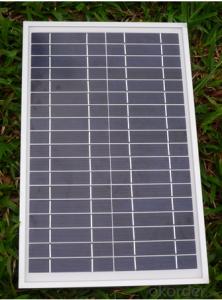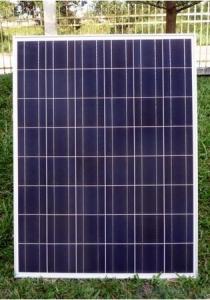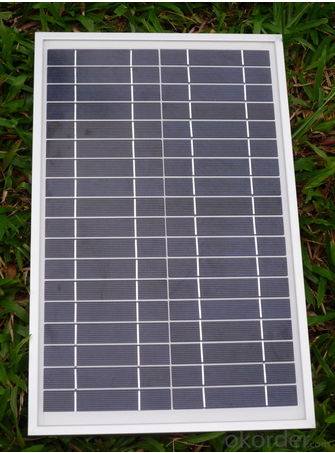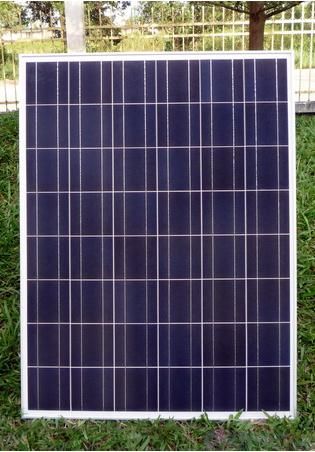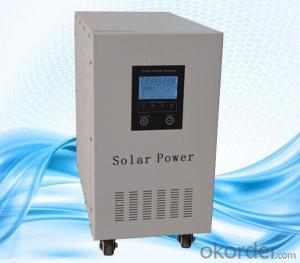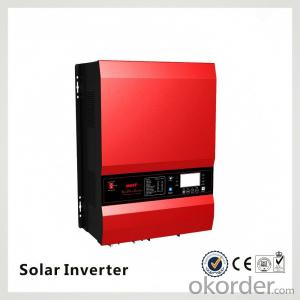4000w Best Hybrid Solar Inverter 4000w Solar Home System - Solar Energy Systems Melbourne FL
- Loading Port:
- Tianjin
- Payment Terms:
- TT OR LC
- Min Order Qty:
- 100 watt
- Supply Capability:
- 200 watt/month
OKorder Service Pledge
OKorder Financial Service
You Might Also Like
Specification
4000W Best Hybrid Solar Inverter 4000W Solar Home System
Product description
A photovoltaic system, also solar PV power system, or PV system, is a power system designed to supply usable solar power by means of photovoltaics. It consists of an arrangement of several components, includingsolar panels to absorb and convert sunlight into electricity, a solar inverter to change the electric current from DC to AC, as well as mounting, cabling and other electrical accessories to set up a working system. It may also use a solar tracking system to improve the system's overall performance and include an integrated battery solution, as prices for storage devices are expected to decline.
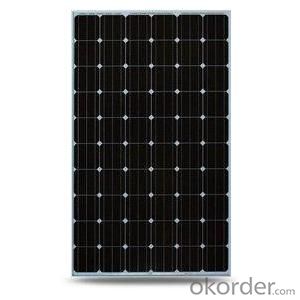
Feature of product:
Pure sine wave solar inverter
. Selectable input voltage range for home appliances and personal computers
. Selectable charging current based on applications
. Configurable AC/Solar input priority via LCD setting
. Compatible to mains voltage or generator power
. Parallel operation with up to 4 units only available for PV200 4KVA/5KVA
. Auto restart while AC is recovering
. Overload and short circuit protection
. Smart battery charger design for optimized battery performance
. Cold start function
Parameter
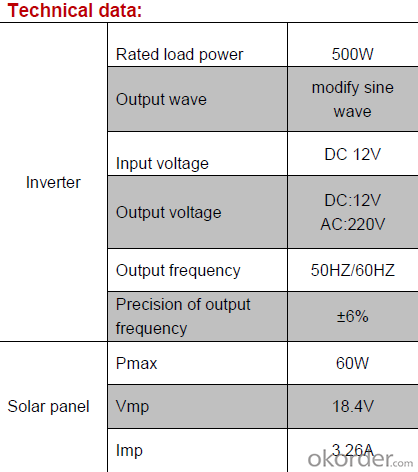
Packaging
Material in stock can be produced (procedure 5-20days) right away after pre-payment confirmation. COSCO Mearsk MSCship to worldwide for safe shipping, don't worry about package damage or loss. It takes about 15-40 days to worldwide, Please note us your contact details include your phone number for easy contacting from shipping company officer.
- Q: What are the environmental impacts of solar energy systems?
- Solar energy systems have numerous environmental benefits, including reducing greenhouse gas emissions, minimizing air and water pollution, and preserving natural resources. However, the manufacturing and disposal processes of solar panels can generate some waste and require energy inputs. Additionally, land use for large-scale solar installations can impact local ecosystems. Overall, the environmental impacts of solar energy systems are significantly lower compared to conventional energy sources.
- Q: Can solar energy systems be used for commercial buildings?
- Yes, solar energy systems can be used for commercial buildings. Many businesses are increasingly adopting solar energy as a viable and sustainable source of power. Commercial buildings can install solar panels on rooftops or in open spaces to generate electricity, reduce energy costs, and lower carbon emissions. Additionally, government incentives and tax credits have made it financially attractive for businesses to invest in solar energy systems.
- Q: Can solar energy systems be used for powering farms?
- Yes, solar energy systems can be used for powering farms. Solar panels can be installed on rooftops or open fields to capture sunlight and convert it into electricity. This electricity can then be used to power various farm operations such as irrigation systems, lighting, machinery, and even to generate heat for livestock. Additionally, solar energy systems can help farmers save on electricity bills, reduce their reliance on fossil fuels, and contribute to a more sustainable and environmentally-friendly agricultural practice.
- Q: Can solar energy systems be used in areas with limited access to sanitation facilities?
- Yes, solar energy systems can be used in areas with limited access to sanitation facilities. Solar energy systems are independent of sanitation facilities and do not require any connection or reliance on them. They can provide clean and renewable energy for various purposes such as lighting, cooking, heating water, and powering basic appliances, even in areas where sanitation facilities are limited or nonexistent. This makes solar energy an ideal and sustainable solution for improving living conditions and promoting development in such areas.
- Q: How does the cleanliness of solar panels affect energy production?
- The cleanliness of solar panels greatly affects energy production. Dust, dirt, pollen, bird droppings, and other forms of debris can accumulate on the surface of the panels, blocking sunlight and reducing their efficiency. Regular cleaning and maintenance of solar panels are necessary to ensure optimal energy output.
- Q: Can solar energy systems be used for powering off-grid eco-tourism destinations?
- Yes, solar energy systems can be used for powering off-grid eco-tourism destinations. Solar panels can harness the power of the sun and convert it into electricity, making it an ideal renewable energy source for remote locations. By installing solar panels, off-grid eco-tourism destinations can reduce their reliance on fossil fuels, minimize carbon emissions, and promote sustainable practices. Additionally, solar energy systems can provide a reliable and consistent power supply, ensuring that these destinations can offer modern amenities and services to their visitors while preserving the natural environment.
- Q: Can a solar energy system be used to heat water?
- Certainly! A solar energy system has the capability to warm water. Solar water heaters utilize the energy from the sun to heat water for a multitude of purposes, including household usage, swimming pools, and industrial operations. These systems usually comprise solar collectors that absorb the sun's radiation and transmit the heat to a fluid. This fluid is subsequently circulated to warm the water contained in a tank. Solar water heaters are highly efficient, economical, and eco-friendly substitutes for conventional water heating techniques. They have the potential to substantially decrease energy expenses and emissions of greenhouse gases, all while ensuring a consistent supply of hot water throughout the year.
- Q: Can a solar energy system be installed on a ground mount?
- Yes, a solar energy system can be installed on a ground mount. Ground-mounted solar systems are a popular choice for homeowners or businesses who have ample space on their property. By installing solar panels on a ground mount, they can be positioned at the optimal angle for capturing sunlight, maximizing energy production. Ground mounts also offer flexibility in terms of system size and orientation, making them suitable for various locations and terrains.
- Q: Can a solar energy system be installed in areas with high seismic activity?
- Certainly! Solar energy systems can be installed in regions with significant seismic activity. However, it is vital to guarantee that the system is designed and installed to withstand the potential impacts of seismic events. There are several measures that can be taken to enhance the system's resilience, including: 1. Strengthened Mounting Structures: Typically, solar panels are mounted on structures like rooftops or ground-mounted frames. These structures should be designed to endure seismic forces, including ground shaking. Utilizing reinforced materials and additional bracing can make the mounting structures more robust. 2. Flexible Wiring and Connectors: Special consideration should be given to the installation of flexible wiring and connectors, as solar panels are connected through wiring. This allows for some movement during seismic events, reducing the risk of damage or disconnection. 3. Secure Panel Installation: To prevent solar panels from dislodging during an earthquake, it is important to securely fasten them to the mounting structures. Additional measures like using specialized clamps or adhesives can enhance the stability of the panels. 4. Proper Grounding: Ensuring proper grounding of the system is crucial to protect against electrical surges and potential damage caused by seismic events. It is important to adhere to local electrical codes and guidelines to ensure the system is safely grounded. 5. Regular Inspections and Maintenance: Conducting regular inspections helps identify any potential issues or damage to the solar energy system. Prompt maintenance and repairs can help mitigate any risks associated with seismic activity. By adhering to these guidelines and collaborating with experienced professionals, it is feasible to successfully install and operate a solar energy system in areas with high seismic activity.
- Q: Can solar energy systems be installed on mobile homes or RVs?
- Yes, solar energy systems can be installed on mobile homes or RVs. In fact, they are a popular choice for powering these vehicles as they provide a reliable and sustainable source of electricity while on the move. Solar panels can be mounted on the roof of the mobile home or RV, and the system can be customized to meet the specific energy needs of the vehicle.
Send your message to us
4000w Best Hybrid Solar Inverter 4000w Solar Home System - Solar Energy Systems Melbourne FL
- Loading Port:
- Tianjin
- Payment Terms:
- TT OR LC
- Min Order Qty:
- 100 watt
- Supply Capability:
- 200 watt/month
OKorder Service Pledge
OKorder Financial Service
Similar products
Hot products
Hot Searches
Related keywords
